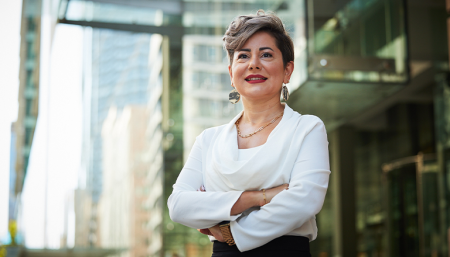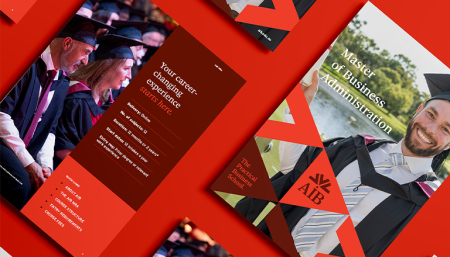Empowering the next generation: What NAIDOC means to the AIB community

Beginning as a movement for the recognition and rights in the 1920’s, NAIDOC week has always been more than a celebration – it’s a powerful reminder of history, identity and resilience. Ignited by Indigenous communities driven by a future built on justice and equality, NAIDOC stands for National Aborigines and Islanders Day Observance Committee. Over the years, it has grown into a national observance that honours the enduring strength of Aboriginal and Torres Strait Islander peoples.
National NAIDOC Committee Co-Chair, Aunty (Professor) Lynette Riley reminds us that “Each NAIDOC reinforces our vision for an Australia where Indigenous voices are not only heard but lead the way”. This year marks a significant milestone – the 50-year anniversary of NAIDOC Week, this year celebrated with the theme: ‘Next Generation: Strength, Vision & Legacy’.
NAIDOC remains a powerful community-led movement grounded in vision and integrity. It is embraced not only in Indigenous communities, but by Australians from all walks of life. At AIB, we believe that NAIDOC Week is an invitation for all of us to learn about First Nations cultures and histories and celebrate one of the oldest, continuous living cultures on Earth. In the lead up to the 50-year anniversary, we reached out to the AIB community to find out what NAIDOC means to them and to importantly, share their stories with you.
Willhameena Power: A touchstone for society
Willhameena Power, an AIB Master of Management candidate, was born in Tamworth on Kamilaroi country. Her connection to culture began early, before she even started school.
“I was born in Tamworth (Kamilaroi country) and have always known that we identified as Aboriginal; we learned our relative tree before kindergarten. I attended the first NAIDOC day when I was around 14, when the first activities happened in my high school. It didn’t mean much to me then, because culture wasn’t talked about. It was simply a matter of who you were, and you learned where you fit within the family structure.”
Willhameena admits that she was the first in her family to complete high school, the first to attend university, the first to earn a degree, and the first to pursue postgraduate studies.
“My study time has seen the 40th anniversary of the Referendum (2007), Kevin Rudd‘s Apology (2008), the start of more formalised reporting on indigenous matters through the 2010s, talks of treaty, and the forward and backward of progress on the same issues that were prevalent when I first started working in Aboriginal affairs(i.e., land councils, legislation and reconciliation). Through all of this, NAIDOC has been a constant. For me, it is a little touchstone, a pivot point for society at any given moment. What has changed? What has stayed the same?” Through my MBA and coursework for my MMgt journey, I have continued to seek and highlight Indigenous participation in management, marketing, and business. I look forward to a future based in research that focuses on Indigenous and diverse community networks.
When asked what NAIDOC means for non-Indigenous Australians, she offers this:
“I believe NAIDOC can be whatever people want it to be. I see it as a good litmus test for where people stand on Indigenous issues, their cultural leanings, or personal beliefs and opinions. For those who want to learn or expand their cultural experiences, NAIDOC provides opportunities for engagement, safe spaces to explore new ideas or situations, and a platform for establishing new conversations or friendships.”
Kenneth Letander: Valuable opportunities and meaningful connections
For AIB alumnus Kenneth Letander, NAIDOC Week echoes the spirit of National Indigenous History Month in his home country of Canada. A proud Treaty First Nations (Ojibway) person from Manitoba’s Treaty Two territory, Ken is a Strategic Procurement Advisor who brings more than a decade of experience working with Indigenous and rural communities across Canada, and formerly worked with the Truth and Reconciliation Commission (TRC) of Canada as a Statement Collections Officer. Ken helps to spread the word about National Indigenous History Month through his art and encourages others to gain a deeper understanding of First Nations, Inuit and Métis experiences through their own voices.
“As an AIB alumnus and Treaty First Nation (Ojibway) Person, National Indigenous History Month (June) in Canada holds deep significance for me. It is a time for personal reflection, appreciation, and connection. It’s an opportunity to honour our First Nations, Métis, and Inuit (Indigenous) Peoples and cultures, truths, histories, music and art.
It is time to acknowledge the challenges we have overcome, and celebrate the resilience that allows us to carry forward the sacred stories told to us by our Elders and communities that shape both our present and the future we build, while remembering our pasts. For me, June 21 [National Indigenous Peoples Day] is deeply personal—an opportunity to reflect on my own path and express gratitude for the Elders, Knowledge Holders, and Matriarchs who have guided and continue to shape my journey on Turtle Island.”
Kenneth also reflects on what these events mean to non-indigenous people:
“Across Canada, both Indigenous and non-Indigenous communities come together to celebrate National Indigenous Peoples Day. For non-Indigenous people, these events provide valuable opportunities for education, cultural awareness, and deeper understanding, facilitating empathy and meaningful connections. They offer a chance to learn about Indigenous histories, languages, and cultures while encouraging reflection on reconciliation and ways to contribute to a more equitable future for both Indigenous and non-Indigenous Peoples. This can take many forms, from advocating for fair policies to supporting Indigenous-led initiatives such as Aboriginal Friendship Centres, which provide essential resources for Elders, youth, and families. Even seemingly small actions can create lasting impact and strengthen genuine partnerships in reconciliation.”
Rikki Cooper: Time for reconciliation, dialogue, and mutual respect
For Rikki Cooper, Indigenous Engagement and People & Culture Business Partner/ BGIS, who is currently studying AIB MBA specialising in Human Resource Management, NAIDOC holds deep personal significance:
“As a proud Nari Nari and Wiradjuri woman, NAIDOC is an opportunity to reflect on our heritage, resilience, and the ongoing journey towards equality and recognition. It is a time to honour those who have come before us, those who continue to break barriers, and the next generation who will carry our stories forward”
Rikki believes that for non-Indigenous Australians, NAIDOC offers a vital opportunity for education and awareness.
“NAIDOC serves as a reminder of the importance of reconciliation, creating spaces for dialogue, and deepening mutual respect. It also highlights the need for non-Indigenous Australians to actively contribute to closing the gap, both in terms of opportunities and understanding.”
Barbara Coat: A time to listen and learn
Similarly to Rikki, AIB’s Librarian & Orientation Coordinator Barbara Coat believes that “NAIDOC is a time of observation. It is time to listen, learn, and to stand in solidarity with First Nations people.”
Barbara shared that respect and recognition of First Nations people has always been dear to her heart.
“I grew up in a small Adelaide hills town with many stolen generation children as my dearest friends. During my early university days, I was a member of the Aboriginal Task Force at the University of South Australia, focussed my assignments on improving library services for First Nations people, and lobbied the Library School to be inclusive of First Nations students. One of my happiest memories of those days was dying the Aboriginal Flag into my friends’ hair for his musical performance at the handover of Uluru-Kata Tjuta National Park back to the Anangu traditional owners in 1985.”
For Barbara, NAIDOC “represents an opportunity to grow, reflect, and support a future built on truth, justice, and unity. NAIDOC should not just commemorate but be felt, understood, and acted upon as a shared step towards a more inclusive and honest Australian story. All stories and experiences are personal and important, and I encourage you to engage with NAIDOC Week and beyond.”
Dr Mamun Ala: A moment of truth-telling and hope
As a Senior Lecturer of Strategic Management & International Business at AIB, Dr Mamun Ala plays a vital role supporting Aboriginal and Torres Strait Islander learners through mentorship, wellbeing, and one-on-one academic support.
“My role is centred on creating a culturally safe and supportive environment that acknowledges the lived realities and aspirations of our Indigenous learners. One of the key initiatives I’ve been involved in is building one-on-one academic and wellbeing support channels, allowing Indigenous students to share their challenges and goals in a trusted space.”
For Mamun, NAIDOC’s 50th Anniversary highlights the power of intergenerational knowledge and the importance of empowering young Indigenous Australians to lead with pride in their identity and cultural legacy.
“I believe NAIDOC is a moment of truth-telling, reflection, and hope. NAIDOC reminds us to honour the deep cultural heritage, strength, and resilience of Aboriginal and Torres Strait Islander peoples. To me, reconciliation is a shared journey rooted in respect, responsibility, and truly listening to Indigenous voices – past, present, and future.
As an academic, Mamun is keen on bringing Indigenous perspectives within MBA curricula (i.e., Reimagining strategy through Indigenous worldviews in Strategic Management subject) as he beliefs such approach ‘encourages students to critically engage with leadership, ethics, and sustainability through the lens of Indigenous knowledge and values.”
Dr. Svetlana De Vos: Elevating Indigenous voices
For Dr Svetlana De Vos, AIB Senior Lecturer and Discipline Leader in Marketing and Entrepreneurship, NAIDOC is a powerful reminder to reflect on who gets to be seen and heard in business education and curriculum.
Svetlana believes that the Indigenous /First Nations Peoples are largely invisible in marketing’s discourse and the Indigenous /First Nations peoples often do not ‘see themselves’ represented in the business curriculum. Her team is currently working to change this by bridging the gap and bringing Indigenous business expertise into the curriculum via an ongoing teaching and learning project at AIB.
“NAIDOC to me is about honouring and elevating Indigenous voices. It gives me an opportunity to engage and get to know our local Aboriginal and/or Torres Strait Islander communities.”
Svetlana believes that “bringing the industry –based expertise of Indigenous / First Nations Peoples into business contexts within Marketing and Entrepreneurship Discipline illuminates unique practices, challenges and success stories. This is beneficial for all learners!
Leading this project has been a fulfilling experience for Svetlana: “It has been a privilege to learn from First Nation Peoples, the true Custodians and Stewards of Land! Regardless of their country of origin (Australia, Canada, New Zealand), they all shared their business expertise with enthusiasm, passion and determination. Their sustainable approaches to business practice need to be acknowledged and celebrated.”
At AIB we believe that NAIDOC invites everyone to listen, learn, and reflect on our shared history and future. Together, we can invest in a future where every voice is heard, every story matters, and every person feels valued.
2025 National NAIDOC artwork by naidoc.org.au, provided under a Creative Commons Attribution-NonCommercial-NoDerivatives 4.0 International License (CC BY-NC-N4 4.0) added on 07/07/2025





